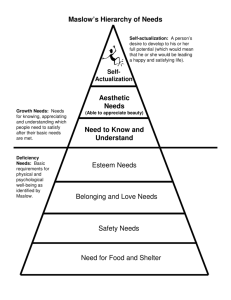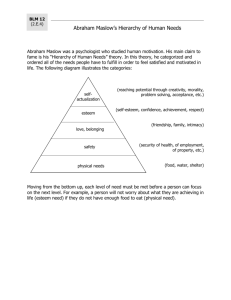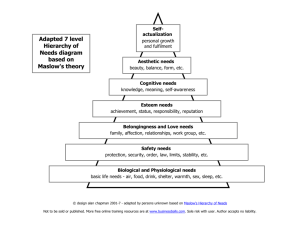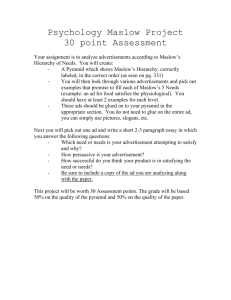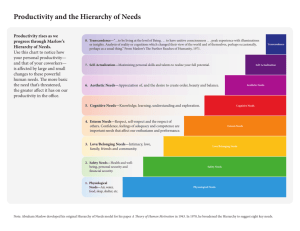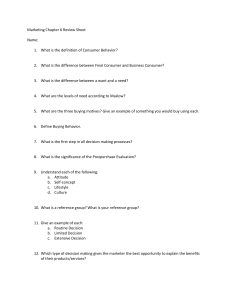T7_Motivation_Maslow
advertisement
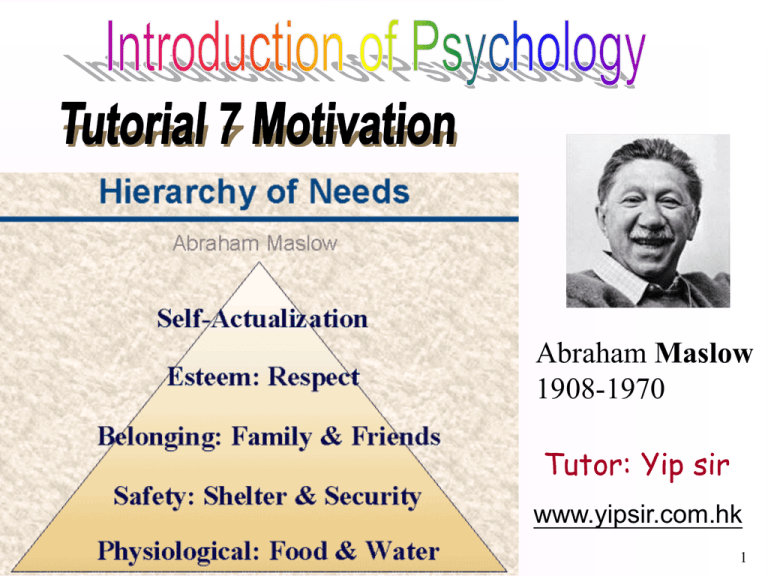
Abraham Maslow 1908-1970 Tutor: Yip sir www.yipsir.com.hk 1 Abraham Maslow 1908-1970: 1. Maslow was a psychologist who studied law at the City College of New York and Cornell. 2. He received his BA in 1930, his MA in 1931, and his PhD in 1934, all in psychology from the University of Wisconsin. 3. Maslow served as the chair of the psychology department at Brandeis from 1951 to 1969. 4. Maslow noticed while he worked with monkeys early in his career that some needs take precedence over others. 5. Maslow's primary contribution to psychology is his Hierarchy of Human Needs, which he often presented as a pyramid. 2 Maslow’s Hierarchy of Human Needs NEEDS: a lack of something required or desired. *Needs motivate us to act! 3 MASLOW’S HIERARCHY OF NEEDS --| | Thrive | | --- (Achieving individual potential) (Self-esteem and esteem from others) (Love, affection, being part of groups) (Shelter, removal from danger) <- Life Support (Some) (Health, food, sleep, liquid, sex, etc.) <- Life Support (Mostly) Survive --Alive --Dead 4 MASLOW’S HIERARCHY OF NEEDS (Revised) --| | Growth “B-Needs” | | --| Deficiency “D-Needs” | --5 Maslow’s Need Hierarchy Theories 1. Needs are aroused from lowest to highest order. 2. Lower needs must be met before an individual can strive to meet the higher needs. 3. Individual would stay at a certain need level until that need was satisfied 6 PHYSIOLOGICAL-necessary for life; unmet, these needs lead to death 1. Food 2. Water 3. Oxygen 4. Sleep 5. Protection from extreme temperatures 6. Elimination 7. Sensory needs 8. Motor needs 7 SAFETY/SECURITY 1. The need to be free from anxiety and fear 2. The need to be secure in the environment 3. The need for order and routine 8 Physiological and Safety Needs -Necessary, but not Sufficient 1. Life support addresses the two lowest levels of the hierarchy: physiological and safety. 2. Without these people will not act civilly. 3. Our Hong Kong society may succeed perfectly at the first two levels. There are many places in the world today where the first two levels are not being satisfied. 9 Belonging and Love 1. Social acceptance, friendship, to be loved 2. Need to belong, to relate to others, that is why humans have a desire to belong to groups: clubs, work groups, religious groups, family, gangs, etc. 3. Sexuality – a person’s feelings/attitude toward their masculine/feminine nature 10 ESTEEM 1. There are two types of esteem needs. First is selfesteem which results from competence or mastery of a task. Second, there's the attention and recognition that comes from others. 2. Feeling important and worthwhile – includes respect, approval, appreciation 3. We engage in activities that bring achievement, success, and recognition 4. We gain self-confidence and begin to direct our actions toward becoming what we WANT to be 11 SELF-ACTUALIZATION 1. Self-realization; obtaining our full potential; becoming confident, eager to express our beliefs, and willing to reach out to others to help them 2. They can seek knowledge, peace, esthetic experiences, self-fulfillment, oneness with God, etc. Only 2% of the populations are selfactualization 12 Application of Maslow’s Hierarchy of Needs In an underprivileged community, there is a newly established primary school. Many of the students there usually come to school without taking breakfast. They are in lack of favorable home environment to study. Their families cannot afford them taking extra-curricular activities. Failing to catch up with their school work and lacking proper parental supervision, many students are on the verge of going astray. Suppose you were the principal of that primary school. How would you use Maslow’s theory to improve motivation of students to learn? 13 Extra Activity 1. Think of TV commercials or magazine advertisements that target at fulfilling our needs in Maslow’s hierarchy 2. For example, cookie advertisement is targeted at the physiological need. 14 What hierarchy of needs do the following kinds of commercial services address to? Cosmetics, fast cars, home improvements, furniture, fashion clothes, lifestyle products and services. Dating and match-making services, chatlines, clubs, societies, Macdonalds, 'family' themes Wife/child-abuse help-lines, social security benefits Home security products (alarms, etc), life assurance Community colleges, continuing education centres 15 Epilogue 1. Maslow and others added more needs in later publications 2. In the 1970’s, cognitive and aesthetic needs were inserted between #4 and #5 3. In the 1990’s, transcendence (helping others to achieve self-actualization) was added as #8 4. Do you think that Maslow’s approach is valid? Must the lower needs be satisfied before using the higher ones? 5. How would you use Maslow’s theory to improve motivation of people (students, employees)? 16 The end 17
